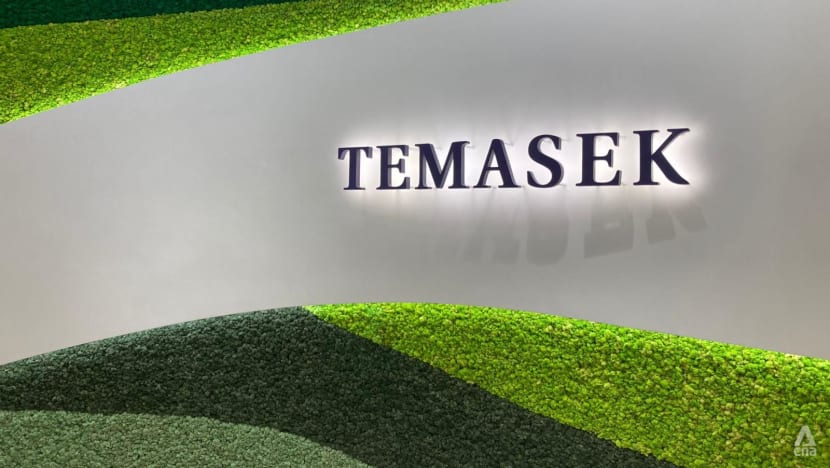Singapore's Temasek unveils S$44 billion 'sustainable living' portfolio
The state investment company launched its first sustainability report alongside its annual Temasek Review on Tuesday.

A view of investment company Temasek's logo at its Singapore headquarters. (Photo: CNA/Abigail Ng)

This audio is generated by an AI tool.
SINGAPORE: Temasek has unveiled a "sustainable living" investment portfolio valued at S$44 billion (US$32.6 billion), in an inaugural report outlining its strategy towards net zero by 2050.
The portfolio, which excludes institutional assets and liabilities, comprises S$38 billion in sustainability-focused investments and S$6 billion in climate transition investments.
Temasek provided the figures on Tuesday (Jul 9) in its first sustainability report at the launch of its annual Temasek Review, where it announced S$389 billion in total net portfolio value as of Mar 31.
In the last financial year, S$3 billion of investments were added to its sustainability portfolio, covering areas such as food, water, waste, energy, materials, clean transport and the built environment.
Its latest investments include electric vehicle companies Mahindra Electric Automobile in India and BYD in China, sustainable battery solutions provider Ascend Elements and electrolyser manufacturer Electric Hydrogen, both in the US.
In May, Temasek also partnered with Canadian fund Brookfield to buy out Neoen, a France-based renewable energy company.
Its climate transition investments cover high-emitting sectors looking to transition to climate-friendly products and services, such as Sembcorp Industries and Danish gas company Topsoe.
Temasek said it has so far reduced net carbon emissions attributable to its portfolio by 5 per cent from 2010 levels. By 2030, it hopes to halve it from 2010 levels to 11 million tonnes of carbon dioxide equivalent (MtCO2e) and by 2050, to achieve net zero emissions.
Chief investment officer Rohit Sipahimalani said sustainable living investments used to be Temasek's smallest portfolio. But it is steadily increasing and the fastest-growing, he told reporters during a media briefing.
Asked why Temasek was revealing the portfolio value this year for the first time, head of ESG (environmental, social, and governance) investment management Park Kyung-Ah said the report was done in response to feedback calling for information to be consolidated.
"We wanted to make sure that we go much more in-depth and be much more transparent. And we also took the opportunity to develop a much more systematic way of defining and measuring for what we call sustainability living-aligned investments," said Ms Park, who is also the managing director for sustainability at Temasek.
The sustainability report will be released annually, she added.
In its report, Temasek said companies with higher standards in some ESG metrics are likely to outperform peers in the future.
Still, there could be a "contradiction" between the state investor's climate goals and financial objectives in the short term, Mr Rohit said.
"We have to look at the tradeoffs as to these ... investments that you need to take in the near term for the longer term sustainability of your returns," he said.
TOP CONTRIBUTORS TO PORTFOLIO EMISSIONS
Five companies – Singapore Airlines (SIA), Sembcorp Industries, Olam Group, PSA International and ST Telemedia – contributed around 80 per cent of Temasek's total portfolio emissions.
These five companies comprise 10 per cent of its portfolio value.
These are businesses within industries that face "inherent decarbonisation challenges", Temasek said, adding that the companies have made significant progress in recent years.
For example, despite the aviation sector's heavy reliance on fossil fuels, SIA invests in newer aircraft that are more fuel-efficient, the report noted.
Sembcorp Industries, which has committed to a "brown-to-green" portfolio transformation, is expanding its renewable energy portfolio.
Last year, Sembcorp Industries divested coal firm Sembcorp Energy India, enabling the company to reduce its greenhouse gas emissions significantly.
The sale of the India unit contributed to a 22 per cent reduction – or 6 MtCO2e – in Temasek's total portfolio emissions in the financial year that ended on Mar 31, 2024, compared to the previous financial year.
Temasek acknowledged criticism levelled against Sembcorp Industries for a "shift in boundaries" without necessarily reducing carbon emissions, but stressed the need to put things in perspective.
Director for Sustainability and Climate Change Strategy Franziska Zimmermann noted that selling the India unit had been a "decisive strategic decision" for the company to focus its business on renewable energy.
Sembcorp Industries has committed to keep working with the new owner, said Ms Zimmermann. It will provide financing tied to actual incentives, so that the new owner will be incentivised to keep reducing greenhouse gas emissions, she added.
“We understand the criticism, but I think we need to see the bigger picture. We need to see also the massive effort that Sembcorp Industries has taken.”

















